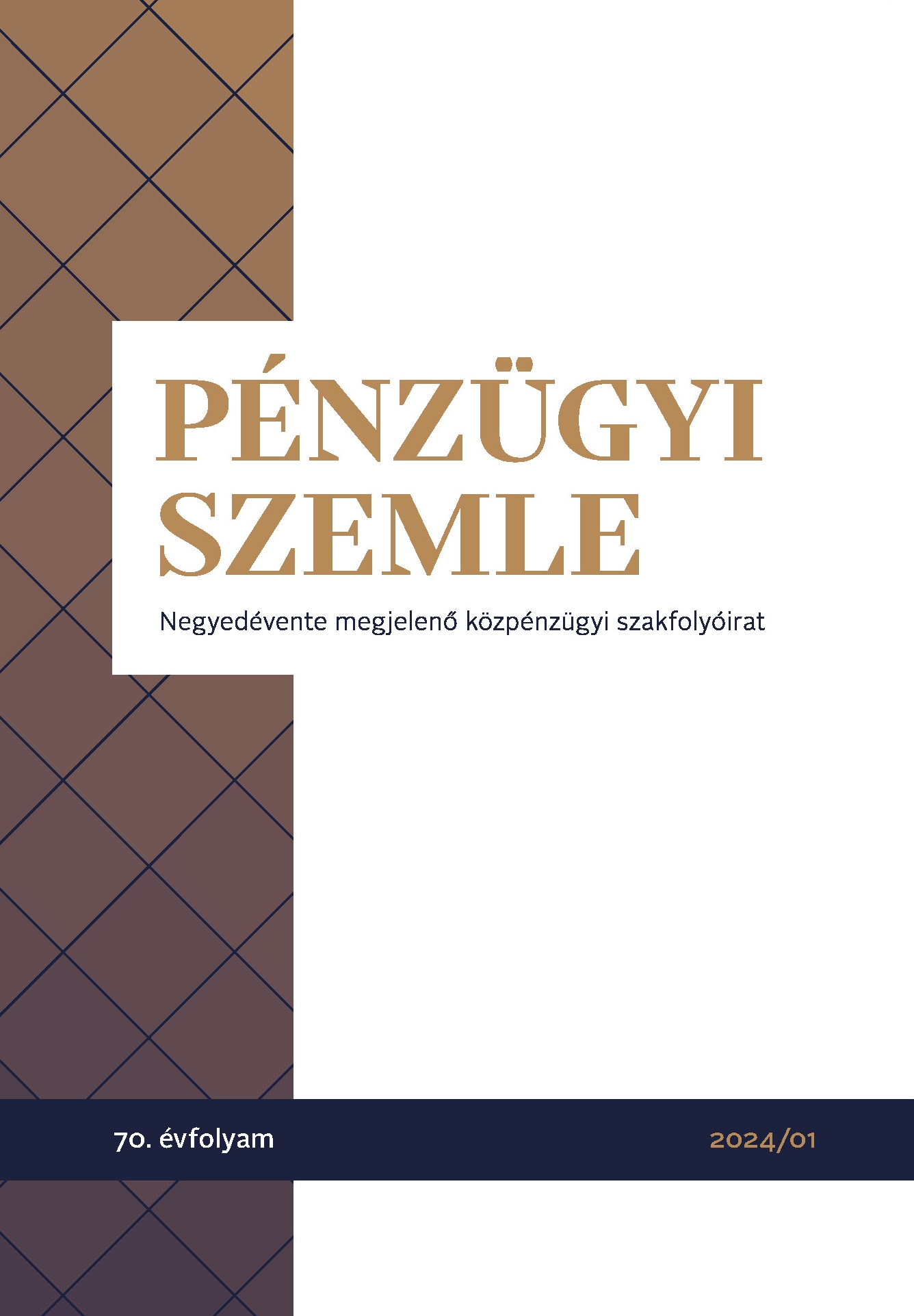The role of compliance in the operation of credit institutions
DOI:
https://doi.org/10.35551/PFQ_2024_1_3Keywords:
compliance management, internal control, money laundering, sanctions, G21, G23Abstract
The aim of this article is to present a conceptual framework for compliance with legal and ethical standards in the business environment, with a particular focus on the role and current challenges of internal control. The paper describes systems and methods for developing effective compliance risk management strategies. The paper presents the importance of an organization’s internal control systems through a literature review. It shows how compliance tools can be used to prevent harmful processes and how to deal with abuses such as money laundering. Finally, the article outlines new compliance challenges, such as the indirect effects of the Russia-Ukraine war and the challenges of implementing sanctions.
References
Ambrus, I. (2020). https://mersz.hu/ambrus-farkas-a-compliance-alapkerdesei//, Chapters I and II.
Ambrus, I., Farkas, Á. (2019). The fundamentals of compliance - the theory and practice of ethical corporate operations. Wolters Kluwer Hungary Kft..
Bálint, P. (2016). The dilemmas of the predicate offence of money laundering. Home Affairs Review, 65-75.
Balogh, A. (2011). Risk management and risk assessment. Hungarian Quality, 6-14.
Balogh, M. (2015). A labour compliance audit. Wolters Kluwer, Budapest, Chapters I-III.
Benedek, P. (2014). Assessing corporate compliance. Vezetéstudomány - Budapest Management Review, 29-39.
Benedek, P. (2019). Compliance management in financial services. Labour Review, 41-51.
Burg, D., Hussain, A., Watson, R. (2021). How do you rise above the waves of a perfect storm? The EY Global Information Security Survey 2021. https://www.ey.com/en_gl/cybersecurity/cybersecurity-how-do-you-rise-above-the waves-of-a-perfect-storm
COSO (2013). COSO Framework 2013 for Internal Controls and Management Responsibilities - By Compliance Global Inc: https://www.academia.edu/11623304/COSO_Framework_2013_for_Internal_Controls_and_Management_Responsibilities_By_Compliance_Global_Inc
Dniestrzanska, E. (2015) Monitoring of Compliance Risk in the Bank, Procedia Economics and Finance, 800-805.
Domokos, L. (2019):Audit - a tool for sustainable good governance. Akadémiai Kiadó, Budapest, Chapter 2.
Duncan, C. (2022) Ensure Compliance With Bank Policies and Procedures. https://www.alert-software.com/blog/ensure-compliance-with-bank policies-and-procedures
Council of Europe (2020). Fight against money laundering and terrorist financing. https://www.consilium.europa.eu/hu/policies/fight-against-terrorism/fight-against-terrorist-financing/
European Court of Auditors. (2016). The European Commission’s system of organisational governance: good practices (under Article 287(4), second subparagraph, TFEU). https://www.eca.europa.eu/lists/ecadocuments/sr16_27/sr_governance_hu.pdf
European Central Bank. (2022a): FAQs on Russia-Ukraine war and ECB Banking Supervision. https://www.bankingsupervision.europa.eu/press/publications/html/ssm.faq_Russia_Ukraine_war_and_Banking_Supervision~8360ccdf6f.en.html
European Central Bank. (2022b). National competent authorities for the implement of EU restrictive measures (sanctions). https://finance.ec.europa.eu/system/files/2023-11/national-competent-authorities-sanctions-implementation_en.pdf
IAASB (2022). 2022 Handbook of the International Code of Ethics for Professional Accountants. https://finance.ec.europa.eu/system/files/2023-11/nationalcompetent-authorities-sanctions-implementation_en.pdf
IIA. (2019) IIA Three Lines of Defence Model - An updated version of the “three lines of defence”. https://preprod.theiia.org/globalassets/documents/resources/the-iias-three-lines-model-an-update-of-the-three-lines-of defense-july-2020/three-lines-model-updated-hungarian.pdf
IMF (2021): IMF and the Fight Against Money Laundering and the Financing of Terrorism. https://www.imf.org/en/About/Factsheets/Sheets/2023/Fight-against-money-laundering-and-terrorism-financing
Inzelt, É., Bezsenyi, T. (2021). Understanding the characteristics of corporate crime: theoretical considerations and empirical research findings. ELTE Budapest.
Isayev, F. (2021). Compliance Function as a Pillar of Modern Corporation. https://assets.kpmg.com/content/dam/kpmg/az/pdf/ArticlesNPubs/compliance-function-as-a-pillar-of-modern-corporation.pdf
ISO (2018):ISO 31000:2018 Risk management - Guidelines
Jacsó, J. (2019a) On the concept and role of compliance in economic life. Miskolc Law Review, 82-91.
Jacsó J. (2019b): Money laundering compliance in the domestic and European dimensions in the light of social innovation. https://www.mjsz.uni-miskolc.hu/files/6568/38_jacsojudit_t%C3%B6rdelt.pdf, chapter 3.2.
Juhász, Z., Kovács, R. (2016). New directions in banking risk management in domestic and international practice. Economy and Society : a social science journal, 28-50.
Kaminski, P., Robu, K. (2016): A best-practice model for bank compliance. https://www.mckinsey.com/capabilities/risk-and-resilience/our-insights/a-best practice-model-for-bank-compliance
R. B. Kelecsényi (2016) The relationship between small and medium-sized enterprises and competition law for an ideal compliance policy. Competition Review, 16-30.
Kendall, K. (2021). The growing importance of risk management. Quality and Reliability, 22-26.
Kocziszky G., Kardkovács K. (2020) The role of compliance in protecting community values and interests. Akadémiai Kiadó, Budapest, Chapters 3 and 4.
Kovács L., Marsi E. (2018). Budapest.
Kovács S. (2009). The system of public finance controls, internal control, internal audit in the light of international standards and relevant legislative changes. Health Economic Review, 12-18.
Kozák, A. (2021). Money laundering compliance in the legal profession. Miskolc Law Review, 111-125.
LaBerge, L., O’Toole, C., Schneider, J., Smaje, K. (2020). How COVID-19 has pushed companies over the technology tipping point - and transformed business forever, survey. https://www.mckinsey.com/capabilities/strategy-and corporate-finance/our-insights/how-covid-19-has-pushed-companiesover-the-technology-tipping-point-and-transformed-business-forever
Lavine, J., Ricko, A. (2021). bank regulatory compliance services. https://www.pwc.com/us/en/industries/financial-services/regulatory-services/bank regulatory-compliance.html
Hungarian Banking Association (2017). Best Practice Code for the operation of the compliance function (Best Practice Code). https://www.bankszovetseg.hu/Content/alapdokumentumok/6_melleklet_Compliance_Best_Practice_Kodex_HUN.pdf
Magyar Nemzeti Bank (2022). Recommendation of the Magyar Nemzeti Bank No. 12/2022 (VIII.11.) on the establishment and operation of internal lines of defence, the management and control functions of financial institutions https://www.mnb.hu/letoltes/12-2022-belso-vedelmi-vonalak-ajanlas.pdf
Mesterházy, B. (2016). The basics of enterprise risk management and the practical benefits of risk management. Hungarian Quality, 30-56.
MOL Group. (2021). Code of Ethics and Business Conduct. https://molgroup.info/storage/documents/sustainability/mol_csoport_etikai_kodex.pdf
Ministry of National Economy (2017). Public Internal Control Standards and Practical Guide. Budapest.
Pelei, A. (2022). The role of compliance in the operations of financial institutions. MBA thesis. Budapest University of Technology and Economics, 46-48.
PwC. (2018). Economic crime is a constant threat - 2018 Global and Hungarian Economic Crime and Abuse Survey. https://www.pwc.com/hu/hu/kiadvanyok/assets/pdf/gazdasagibunozes_hu_18.pdf
PwC. (2022). PwC’s Global Economic Crime and Fraud Survey 2022. https://www.pwc.com/gx/en/services/forensics/economic-crime-survey.html
Schmoeller, D. (2022). Have a strong compliance program? Use it as a foundation for risk management. https://reciprocity.com/wp-content/uploads/2022/03/Reciprocity_white_paper_Compliance_Risk_Management.pdf
Sound and effective Compliance Risk Management in Banks (2022). https://www.metricstream.com/insights/effective_compliance_risk_management_banks.htm
Székely, C. (2015). Strategic risk management. TAYLOR : journal of management and organization, 103-118.
Szendrei, F. (2018). The economic background of organised crime and money laundering. Hungarian Police: professional and scientific journal of the Faculty of Police Sciences of the National University of Public Service, 77-91.
Tóth, B., Rácz, A. T., Lippai-Makra, E. (2021). Internal control and financial risk assessment in local governments. New Hungarian Public Administration, 45-55.
Ulfkotte, U. (2013). The US wiretapping was aimed at economic espionage, and the European allies are aware of it. https://uzletihirszerzes.blog.hu/2013/10/11/az_amerikai_lehallgatas_celja_a_gazdasagi_kemkedes_volt_raadasul_ezzel_az_europai_szovetsegesek_is_t
Zéman, Z. (2017). The functional relationship of management accounting with the corporate internal control environment. Jura, 193-198
Downloads
Published
How to Cite
Issue
Section
License
Authors assign copyright to Pénzügyi Szemle / Public Finance Quarterly. Authors are responsible for permission to reproduce copyright material from other sources.












